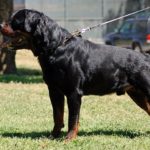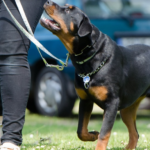Do you have a Rottweiler that is 9 years old? Our furry friends might be vulnerable to various health problems as they age, which we must be aware of. In this article, we will look at the most prevalent health issues that 9-year-old Rottweilers may experience, as well as measures to keep them happy and healthy as they become older. From dental issues to cognitive decline, we’ll cover everything and give you the knowledge you need to ensure your Rottweiler has a long and healthy life. So, grab a cup of coffee and join us as we look at the top health problems for 9-year-old Rottweilers and what you can do to keep your furry friend in good condition.
Dental Issues in Aging Rottweilers
Dental issues are a major source of worry for older Rottweilers, since they may lead to a variety of health complications if left untreated. Rottweilers may acquire tartar and plaque buildup on their teeth as they age, which can lead to gingivitis and periodontal disease. Aside from tartar and plaque accumulation, aged Rottweilers may suffer dental decay and loose teeth. Brushing their teeth, offering dental chews and toys, and arranging frequent vet check-ups are all critical ways to avoid dental difficulties in older Rottweilers. A nutritious diet may also assist to maintain your Rottweiler’s teeth and gums healthy.
Maintaining a Healthy Weight in Senior Rottweilers
Rottweilers may become less active as they age, and their metabolism may decrease, making it easier for them to acquire weight. Excess weight may put pressure on the joints, heart, and other organs, leading to major health issues including osteoarthritis, diabetes, and heart disease. To keep senior Rottweilers healthy, give a balanced food that is suitable for their age, activity level, and any underlying health issues. Furthermore, frequent exercises, like walks or playing, may help your Rottweiler stay active and at a healthy weight. It’s also vital to avoid overfeeding and treating your dog with table leftovers. It’s also important to schedule frequent vet visits to evaluate your Rottweiler’s weight and make any required dietary and activity changes.
Dealing with Cognitive Decline in Aging Rottweilers
Addressing the cognitive decline in elderly Rottweilers may be a difficult undertaking for pet owners. Rottweilers may have changes in cognitive function as they age, such as memory loss, confusion, and behavioral changes. These changes may be caused by a variety of causes, including natural aging, genetics, and underlying medical disorders. It is important to offer healthy food, frequent exercise, and regular veterinarian check-ups to assist your Rottweiler cope with cognitive decline. Providing a stimulating environment as well as frequent mental stimulation via activities such as interactive toys, training, and socializing may also assist in keeping their brain active. Furthermore, maintaining a steady daily schedule and limiting changes in their surroundings might assist prevent confusion and disorientation. Veterinarians may also recommend nutrients and drugs to assist decrease cognitive deterioration.
Exercise and Activity Recommendations
Exercise and movement are essential for 9-year-old Rottweilers’ general health and well-being as they reach their senior years. Exercise on a regular basis may help them stay physically active, maintain a healthy weight, and enhance their overall quality of life. Regular walks, low-impact hobbies like swimming, and interactive games like fetch are all recommended activities for 9-year-old Rottweilers. Jumping or jogging on hard surfaces, for example, are high-impact exercises that might damage their joints. It’s also important to customize the training program and duration to the dog’s specific demands and skills. Additionally, while exercising, it is critical to watch your Rottweiler’s behaviors, energy levels, and general health and make modifications as needed.
The Bottom Line
As a responsible owner of a 9-year-old Rottweiler, it’s important to understand the various health issues that they may experience as they age. These include joint pain, tooth decay, and cognitive deterioration. Schedule frequent vet check-ups, offer balanced food and regular exercise, and create a stimulating environment to ensure your Rottweiler has the best quality of life possible. Working together with your veterinarian to build a personalized strategy that fits your Rottweiler’s individual requirements is also essential. You can help your Rottweiler enjoy a long and healthy life as they age by being knowledgeable and proactive!







